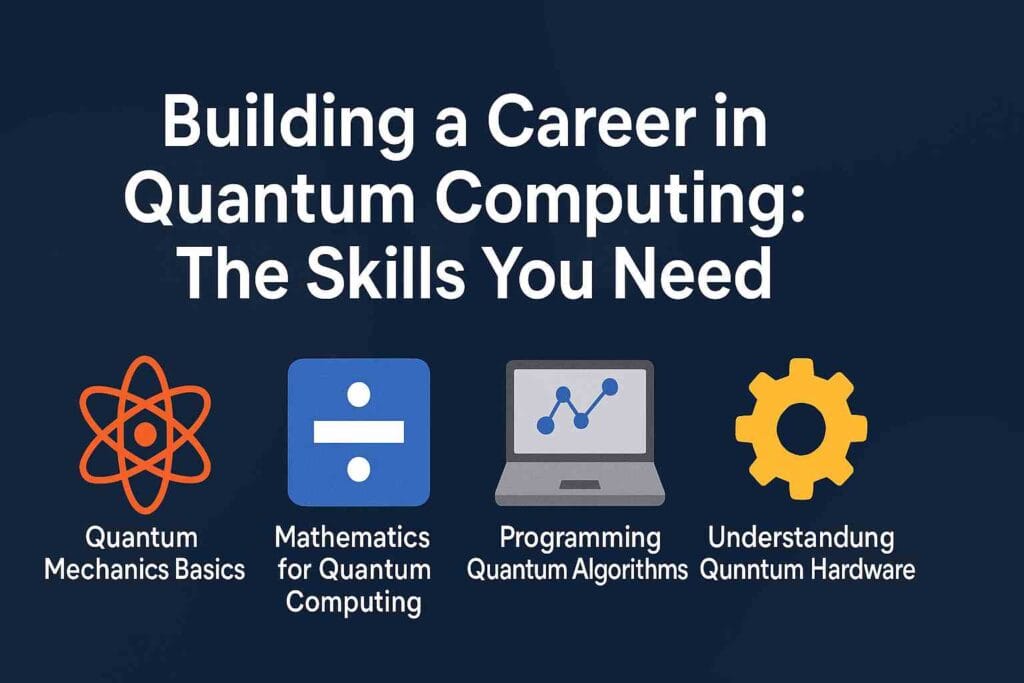Building a Career in Quantum Computing: The Skills You Need

Quantum computing is one of the most exciting and revolutionary fields of the 21st century, opening up new frontiers in science, technology, and business. However, building a career in quantum computing requires a deep understanding of various specialized disciplines, with a strong focus on quantum mechanics at the core. In this article, we’ll explore the skills you need to pursue a career in quantum computing, particularly the fundamental knowledge of quantum mechanics, and how to apply these skills in the real world.
1. A Strong Foundation in Quantum Mechanics
Quantum mechanics lies at the heart of quantum computing. Understanding its principles is essential for anyone aspiring to work in this field. Some core concepts include:
- Wave-Particle Duality: The idea that particles, such as electrons, exhibit both wave-like and particle-like properties. This duality is crucial for understanding how quantum bits (qubits) function in a quantum computer.
- Superposition: In classical computing, bits are either 0 or 1. In quantum computing, qubits can exist in a superposition of both states simultaneously. This ability dramatically increases computing power and complexity.
- Entanglement: A phenomenon where the state of one qubit is dependent on the state of another, no matter the distance between them. Entanglement allows quantum computers to process vast amounts of data in parallel.
- Quantum Tunneling: A phenomenon where particles can pass through barriers they would not be able to in classical physics. Quantum computers use tunneling for optimization problems and cryptographic tasks.
2. Strong Mathematical Background
Quantum computing relies heavily on linear algebra, probability theory, and complex mathematical concepts. Some key areas to focus on include:
- Linear Algebra: Understanding vectors, matrices, eigenvalues, and eigenvectors is crucial for working with quantum states and operators.
- Probability Theory: Quantum computers rely on probabilistic outcomes. Having a solid grasp of probability theory is essential for interpreting quantum algorithms.
- Complex Numbers: Quantum mechanics and quantum computing often deal with complex numbers, as quantum states are described using complex wave functions.
- Quantum Algorithms: Learning about algorithms like Shor’s algorithm (for factoring large numbers) and Grover’s algorithm (for search optimization) is key for practical quantum computing.
3. Expertise in Quantum Programming Languages
While understanding the theory of quantum mechanics is essential, the next step is translating that knowledge into practical applications. This involves learning quantum programming languages and tools designed to work with quantum hardware. Popular quantum programming languages include:
- Qiskit: An open-source framework for quantum computing developed by IBM. It allows developers to design quantum circuits and run them on real quantum computers.
- Cirq: A quantum computing framework from Google designed for building quantum circuits and simulations.
- Quipper: A quantum programming language focused on creating quantum algorithms efficiently.
- Quantum Development Kit (QDK): A toolkit provided by Microsoft that includes the Q# language for quantum programming.
Familiarity with these tools is necessary for creating, simulating, and optimizing quantum algorithms.
4. Knowledge of Quantum Hardware
Quantum hardware is at the heart of quantum computing, and a career in this field will require a strong understanding of the physical systems that make quantum computation possible. Some common types of quantum computing hardware include:
- Superconducting Qubits: This technology, used by companies like IBM and Google, involves creating qubits from superconducting materials that operate at extremely low temperatures.
- Trapped Ion Qubits: This approach uses ions trapped in electromagnetic fields and manipulated using lasers to form qubits.
- Topological Qubits: These qubits are based on the principles of topology, and they promise to be more stable and less susceptible to errors.
Understanding these various hardware platforms and their associated challenges is crucial for working in quantum computing research or development.
5. Problem-Solving and Critical Thinking Skills
Quantum computing is still in its infancy, and the field is rapidly evolving. As a result, those working in this domain need to have strong problem-solving skills to overcome challenges such as error correction, scalability, and noise reduction in quantum computers.
- Innovation: Much of quantum computing research involves coming up with new solutions to problems that have never been addressed before. Creative thinking is essential in developing new algorithms and techniques.
- Collaboration: Quantum computing research often requires collaboration with other specialists, such as physicists, computer scientists, and engineers, to find solutions to complex problems.
6. Continuous Learning and Staying Updated
Quantum computing is an area that is constantly advancing. New algorithms, hardware advancements, and theoretical developments are happening on a regular basis. Staying up-to-date with the latest research papers, conferences, and courses is critical for anyone wanting to stay ahead in this field.
- Research Papers: Reading and understanding the latest research in quantum computing will give you insights into where the field is heading and the current challenges being addressed.
- Conferences and Workshops: Attending conferences such as the IEEE International Conference on Quantum Computing and Engineering or the Q2B Quantum Computing Summit is a great way to network and learn about the latest trends.
- Online Courses and Certifications: Platforms like Coursera, edX, and MIT OpenCourseWare offer valuable resources for learning quantum computing at your own pace.
Conclusion
A career in quantum computing is both challenging and highly rewarding. With a strong foundation in quantum mechanics, mathematics, quantum programming, and hardware, you can position yourself as a key player in this rapidly evolving field. As quantum computing continues to develop, the demand for skilled professionals will only grow, making this an exciting and promising career path for those passionate about pushing the boundaries of technology.
By continually learning and developing your skills, you’ll be ready to tackle the next generation of problems that quantum computing will solve.
Source : Medium.com




